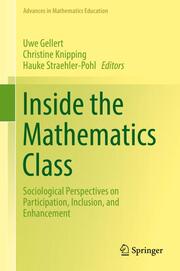Detailansicht
Inside the Mathematics Class
Sociological Perspectives on Participation, Inclusion, and Enhancement, Advances in Mathematics Education
ISBN/EAN: 9783319790442
Umbreit-Nr.: 3946894
Sprache:
Englisch
Umfang: x, 341 S., 38 s/w Illustr., 341 p. 38 illus.
Format in cm:
Einband:
gebundenes Buch
Erschienen am 08.10.2018
Auflage: 1/2018
- Zusatztext
- This volume is a forward-looking intersection of Sociological perspectives on mathematics classrooms and socio-political perspectives on mathematics education. The first perspective has generated a substantial body of knowledge in the mathematics education. Interactionist research has deepened our understanding of interaction processes, socio-mathematical norms and the negotiation of meaning, generating a 'micro-sociology' or a 'micro-ethnography' of the mathematics classroom. More recently, socio-political perspectives on mathematics education interrelate educational practices in mathematics with macro-social issues of social equity, class, and race and with the policies that regulate institutionalized mathematics education. This book documents, strings together and juxtaposes research that uses ethnographical classroom data to explain, on the one hand, how socio-political issues play out in the mathematics class. On the other hand, it illuminates how class, race etc. affect the micro-sociology of the mathematics classroom. The volume advances the knowledge in the field by providing an empirical grounding of socio-political research on mathematics education, and it extends the frame in which mathematical classroom cultures are conceived.
- Kurztext
- This volume is a forward-looking intersection of Sociological perspectives on mathematics classrooms and socio-political perspectives on mathematics education. The first perspective has generated a substantial body of knowledge in mathematics education. Interactionist research has deepened our understanding of interaction processes, socio-mathematical norms and the negotiation of meaning, generating a 'micro-sociology' or a 'micro-ethnography' of the mathematics classroom. More recently, socio-political perspectives on mathematics education interrelate educational practices in mathematics with macro-social issues of social equity, class, and race and with the policies that regulate institutionalized mathematics education.This book documents, strings together and juxtaposes research that uses ethnographical classroom data to explain, on the one hand, how socio-political issues play out in the mathematics class. On the other hand, it illuminates how class, race etc. affect the micro-sociology of the mathematics classroom. The volume advances the knowledge in the field by providing an empirical grounding of socio-political research on mathematics education, and it extends the frame in which mathematical classroom cultures are conceived.
- Autorenportrait
- Uwe Gellert is a Professor of Mathematics Education in the Faculty of Education and Psychology at the Freie Universität, Berlin. His research interests include social inequalities in mathematics education, cross-cultural studies, microanalysis of classroom interaction, sociological perspectives on mathematics, and mathematics teacher education.Christine Knipping is Professor of Mathematics Education at the Faculty of Mathematics and Computer Science at the University of Bremen. Her research interests include argumentation and proving, discursive and interactional mechanisms in mathematics classrooms, sociological perspectives on stratification in school and international comparisons. Hauke Straehler-Pohl is a post-doctoral researcher in Sociology of Education and Mathematics Education in the Faculty of Education and Psychology at the Freie Universität, Berlin. His research interests include social inequalities in the school system, sociology of (pedagogic) evaluation, documentary method, performative approaches to school mathematics, and mathematics teacher education.
